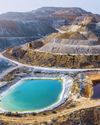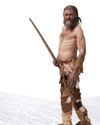
They're microbes, and they're everywhere. You've probably heard people call them germsmicroscopic critters that you have to wash away with soap and water, so they won't make you sick.
Yes, some microbes can cause deadly diseases and infections. But, in general, they have gotten a bad reputation. Most aren't harmful, and some are even good for you. Microbes in the soil can help plants grow. Those on your skin and in your body can help you stay healthy. Scientists have found that if people don't have the right kinds of microbes in their guts-the stomach and digestive systems-there's a greater chance they may have health problems, such as obesity, diabetes, and even certain types of cancer.
A Whole Other
Scale Look at the back of your hand. Millions of microbes are living on just one square inch of skin. Both inside and out, your body has tens of trillions of microbes (a number with 13 zeroes after it). You have about as many microbes as you have human cells in your body. That means half of the cells you're walking around with are microbial. It's like you're only half human.
"If you were asked what are the species that live in your backyard or in your home, you might say there's a cat, three humans, and a couple potted plants," says Anne Madden, a self-styled "microbe wrangler" in Maine. "But most of life exists at a whole other microscopic scale." The ecosystem of microbes that live in a given environment, such as on your skin or in your gut, is called a microbiome. Each microbiome is vast and complex, with hundreds and even thousands of species as different from one another as you and a flower. There are bacteria, fungi (mushrooms are a kind of big fungi), and another group of microbes called archaea.
Scientists are just beginning to learn what kinds of microbes live among us and how they affect us. Researchers are exploring the microbes in our daily lives-in our showers, clothes, armpits, and belly buttons.
Esta historia es de la edición Muse January 2025: Invisible Kingdom de Muse Science Magazine for Kids.
Comience su prueba gratuita de Magzter GOLD de 7 días para acceder a miles de historias premium seleccionadas y a más de 9,000 revistas y periódicos.
Ya eres suscriptor ? Conectar
Esta historia es de la edición Muse January 2025: Invisible Kingdom de Muse Science Magazine for Kids.
Comience su prueba gratuita de Magzter GOLD de 7 días para acceder a miles de historias premium seleccionadas y a más de 9,000 revistas y periódicos.
Ya eres suscriptor? Conectar

A 12-Year-Old Girl's Election Sticker Is a Winner
VOTING IS A FUNDAMENTAL FREEDOM FOR AMERICANS, A MEANS OF DOING ONE'S CIVIC DUTY AND A WAY AN INDIVIDUAL CAN EXPRESS THEIR VOICE. In 1971, the United States lowered its voting age to 18. But that doesn't mean kids and teens under 18 can't participate in elections in various ways.

If everything the human brain does is basically sets of electrical impulses, how exactly does that translate into a state of mind?
You're not the only one asking this question. Every neuroscientist in the world is wondering the exact same thing, says Zach Mainen

EARTH'S TINIEST BUILDERS
THE HIDDEN WORLD OF MICROBES IN THE EARTH'S CRUST

MUMMIES SPEAK
ABOUT MICROBES, MIGRATION, AND MORE

GOING WITH YOUR GUT
HOW DO MICROBES AFFECT OUR HEALTH? LET'S COUNT THE WAYS...

BUG Detective
A burglar sneaks into a house on a quiet street in New York City. He walks through the house, touching countertops and door handles. Finally, he steals a single card from a full deck. Then he leaves.

Little Creatures Among Us THE MANY MICROBES IN OUR DAILY LIVES
When you think you're alone, you're actually not. In the ground, the air, your room, and even your body are Strillions and trillions of creatures so tiny you can't see them.

A Mars Rock Found With Leopard Spots Could Be a Sign of Ancient Life
IN JULY, NASA'S PERSEVERANCE ROVER CAME ACROSS A SPOTTED ROCK IN WHAT WAS ONCE A RIVERBED IN THE JEZERO CRATER ON MARS.

Para Athlete Uses Exoskeleton Suit to Carry the Olympic Torch
In July, a 36-year-old French tennis para athlete, Kevin Piette, got a chance to participate in this summer’s Olympic torch relay without using a wheelchair.

Ancient Egyptians May Have Used a Water System to Lift Stones to Build Pyramid
HOW ANCIENT EGYPTIANS BUILT THE MASSIVE PYRAMIDS IN EGYPT MORE THAN 4,000 YEARS AGO HAS LONG BEEN A TOPIC OF WONDER AND DEBATE.